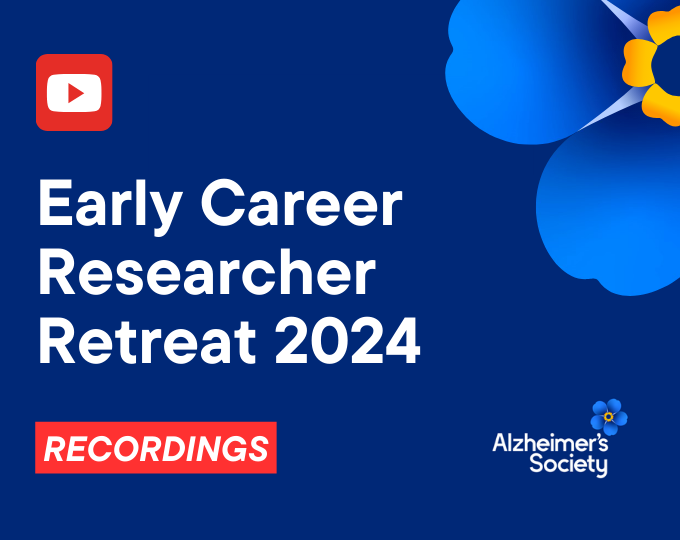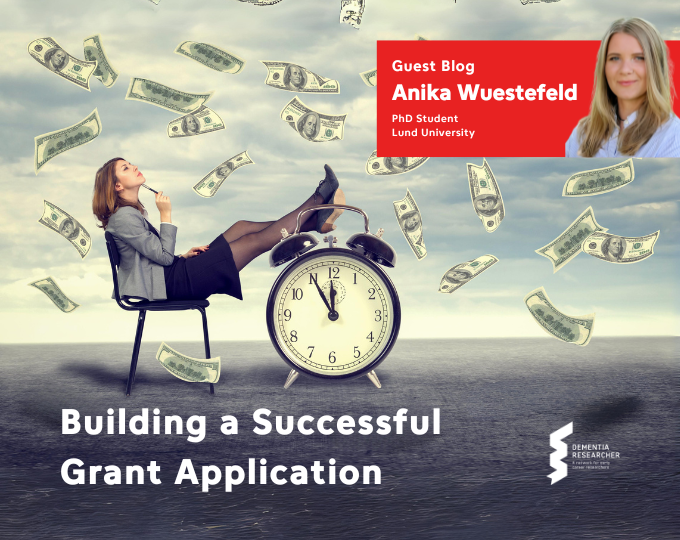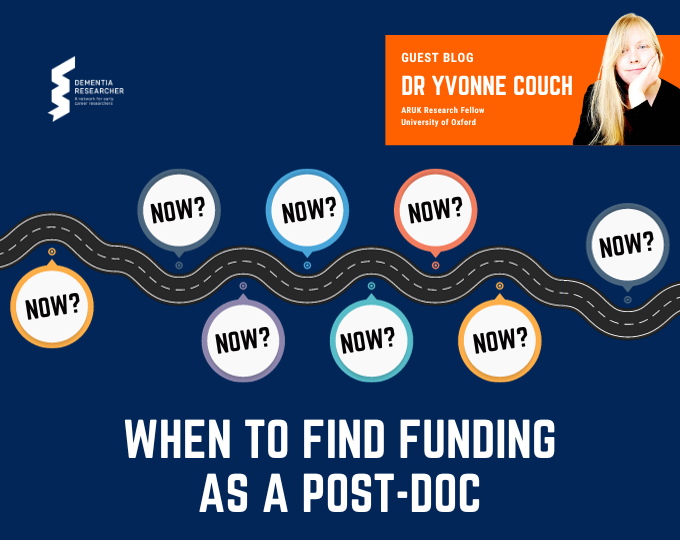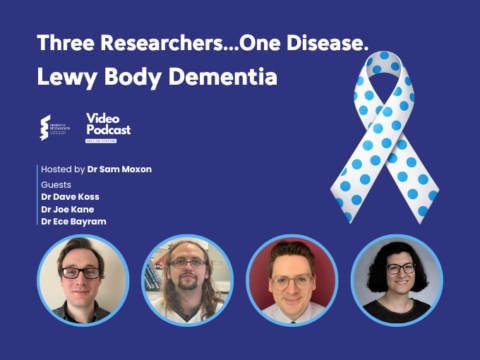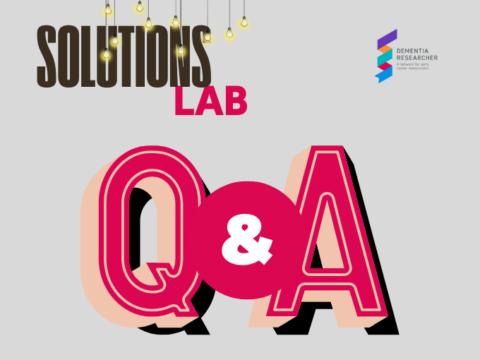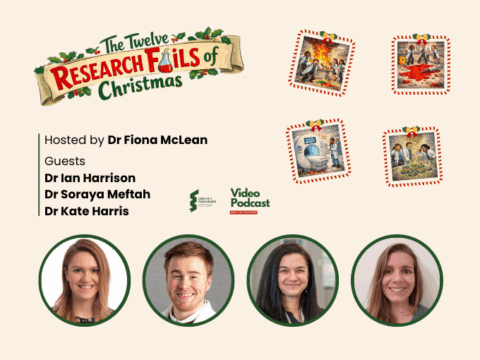Recorded at the Alzheimer's Society ECR Retreat on the 19th June 2024.
In this panel discussion / question and answer session, Katherine Gray, Alzheimer's Society Head of Research chairs a discussion with Professor Heather Mortiboys, Professor Nathan Davies, Dr Jeffrey Davies, Professor Andrey Abramov and John Major.
Panellists provide tips and insights into the grant application process, providing their perspectives as grant reviewers and funding board members. They also provide advice on how to approach grant application writing. The panellists, who are leading researchers and volunteers on grant advisory boards, discuss the key components of a successful grant application, common mistakes, and how to demonstrate the potential impact of research. They also provide advice on resubmitting applications after initial rejection and how to effectively manage career breaks. Together they emphasise the importance of clear hypotheses, realistic expectations, proper costing, and team science. They also highlight the need for perseverance and flexibility in the application process.
Last week Alzheimer’s Society announced that the ECR Retreat will be back on the 8th-9th July 2025. Keep an eye on the Dementia Researcher website for updates, and details on how to apply.
Top Tips from the session:
- Craft a Clear Hypothesis and Plan: Ensure your hypothesis and aims are clearly defined and that your research plan directly addresses the question you're proposing to answer. A focused and well-structured approach is essential.
- Engage Lay Audiences Effectively: Take the lay summary seriously; it’s not just for lay reviewers but all panel members. Avoid leaving it to the last minute, and ensure it communicates the significance and impact of your research clearly and concisely.
- Be Realistic and Honest: Avoid overestimating what you can achieve within the timeframe and resources of the grant. Underestimating costs or overpromising outputs can hurt your chances. Realistic, feasible objectives are more compelling.
- Build Collaborative Teams: Funders appreciate team science. If you lack expertise in a specific area, involve collaborators to strengthen your application. Highlighting teamwork demonstrates a comprehensive and feasible approach to your research.
- Learn from Rejections: If you’re resubmitting, carefully address feedback and demonstrate how your revised proposal aligns with reviewers’ suggestions. If feedback indicates the project doesn’t fit the funder’s priorities, consider adapting it for a better-suited funding body.
Voice Over:
The Dementia Researcher Podcast, talking careers, research, conference highlights and so much more.
Voice Over:
Earlier this year, Dementia Researcher attended the Alzheimer's Society Early Career Researcher Retreat. Today's podcast is a panel discussion recorded live at that event. It brought together five leading experts who have all been awarded major grants and who serve as grant reviewers to share their tips and advice on grant writing. We hope that you find this useful.
Katherine Gray:
Welcome to the grant writing panel. An amazing panel we have here. This session is we're aiming to provide some insights into the grant application process, give a perspective of charity funders and board members, and help you understand how to approach grant application writing, some common pitfalls. We've got some set questions here that we can refer to and we'll open up with. But really want this to be dynamic discussion with you in the room, so do you have a think about what questions you'd like to put to the panel as we go through as well. We've got lots of mics in the room for that.
I will leave it to the panel members to introduce themselves. We are today joined by four leading researchers and our wonderful research network volunteer who sit on grant advisory boards for the Alzheimer's Society and Parkinson's UK. So between them, they've secured funding from the Alzheimer's Society, the Economic and Social Research Council, Marie Curie, MRC, Michael J. Fox Foundation, the NIHR, Parkinson's UK, the Royal Society, and the Weston Brain Institute. So I think they've got some credibility here and some success with their grant writing. I will start with John, if you'd like to introduce yourself.
John Major:
Start with the amateur, right. John Major, former carer, but have been involved with the research network for many years doing lay reviews, but could I remind the potential writers and applicants that it's more than lay reviews. The lay members, some of them, contribute to the prioritising when it comes to the final selection and shortlisting in conjunction with their academic colleagues. Therefore, please bear that in mind when preparing the lay section of your review.
Professor Heather Mortiboys:
Hi, everyone. I'm Heather Mortiboys. I'm a professor at the University of Sheffield, former Parkinson's UK senior research fellow. I sit on the Parkinson's UK College of Experts and also their review panel for some of the other targeted grants, also the research board for Cure Parkinson's and review for ARUK, Alzheimer's Society and many other funders as well.
Professor Nathan Davies:
Hi, everyone. I'm Nathan Davies. I'm currently based at UCL where I'm head of the Centre for Ageing Population Studies and I'm about to move to Queen Mary where I'm becoming a professor and head of the Centre for Psychiatry there. I sit on NIHR's programme grants committee. I previously sat on the HTA committee. I currently sit on the NIHR 3 Schools dementia committee as well. I also sit on the Marie Curie funding committee and I review for various different funders.
Professor Andrey Abramov:
I'm Andrey Abramov, professor of UCL Queen Square Institute of Neurology, representing probably the panel of the Parkinson's Research UK as a former Parkinson's Research UK senior fellow.
Dr Jeffrey Davies:
Hi, everyone. I'm Jeff Davies. I'm a molecular neurobiologist based at Swansea University Medical School. I'm a fundamental researcher interested in gut-brain signalling. I sit on the grant assessment board and I've sat on the board since 2022.
Katherine Gray:
Thank you so much. A very esteemed panel, so do get your thinking caps on for questions. I think we'll start with a nice, easy one about what are the key components to a successful grant application? I don't know if anyone wants to particularly jump in first.
Professor Heather Mortiboys:
I can go then. I start. I think a clear hypothesis and aims and making sure that your research plan actually tests that hypothesis, so you are answering the question that you're setting out to.
Professor Andrey Abramov:
It depends where you apply it as well because if you apply the very tough and very detailed signs to the charity which are more interested with some special area, well, it would be difficult to expect to have a good result even with excellent grant if your grant is not in that particular area.
John Major:
One thing that every lay member has is a dream. They're looking for the breakthrough, preferably tomorrow. They will review the project. Is this the breakthrough? What is the outcome? They will have a different perspective to the outcomes, a different priorities from their lived experience. We had a perfect example early this morning with Baroness Greenfield and I commend that to you. Although it was an academic presentation, a summary she did, towards the end, it was a copy book conclusion that would impress lay people with because she had the outcomes that were positive and it was a deliverable project. So that would've been supported by the lay members. They would enthuse from that one.
Dr Jeffrey Davies:
Yeah. Just to follow up specifically for the Alzheimer's Society board, there's an expression of interest phase followed by a full submission phase. So the expression of interest phase isn't just a box-ticking exercise to make sure that you're eligible. It's really competitive. So there are two pages for the scientific summary and one page for the lay summary. My suggestion would be that you use the lay summary wisely. It's a really important piece of that expression of interest submission. The people that sit on the boards have lots and lots and lots of these three-page summaries to review. So having a really good lay summary in there, as well as a good succinct scientific summary is really important. So I suggest not leaving the lay summary to the last minute and just grouping something down quickly.
Katherine Gray:
Yeah. The lay summary isn't just for the lay panel members, it's for everybody, isn't it? So I guess conversely, what are the common mistakes that you see? Are there any sort of consistent common mistakes that applicants make that really detract from their applications?
Professor Nathan Davies:
I think people are quite often over-ambitious on what they think they can do, and that's particularly problematic for fellowships as well, I think, and studentships. Be realistic as to what you can do and think about what you're going to get out of that. So just because you can't, you're not doing everything you want to do, doesn't mean you're not going to get a good output at the end of it. So really think carefully about that. Also, make sure it's properly costed as well. So certainly with some of the larger programmes of work, we see that they're undercosted because they think it needs to be cheaper, but that's not feasible, then it's not deliverable and that will score you down quite substantially actually because we don't think A, you understand what you're doing or B, you think you can get away with cutting corners and that's not a good look for either of those really.
Professor Andrey Abramov:
Yes. Another issue with our applications, well, we are all fascinated with our research and we think that people might think in the same way as we do. That's why very often we write application in details which might be not necessary, but at the same time it'll be very difficult to understand not even for lay reviewer, but for specialists. For example, I reviewed many grants like this. I think, well, it's very important to write clear what you want and what you plan to do.
Dr Jeffrey Davies:
Yeah. Other pitfalls that potentially can occur, particularly with fellowship applications is there's a lack of information sometimes on what that fellowship will allow you to do and how you project, how that funding will allow you to progress your career. So sometimes that is often missing and it's pulled up, so it's pretty important to include that narrative in your bids.
Professor Heather Mortiboys:
I would just add as well that team science, so that's generally looked favourably on, so don't think that you need to be able to do everything that you want to do to deliver your project get collaborators on board. So funders know that science is a team sport and so having people on board and saying that they will work with you on this is seen in a positive way, not a negative way.
Katherine Gray:
Do we have any questions in the room yet or shall we keep going with our... Because the questions that we're working through are the questions that we get really commonly asked through our grant inquiry's inbox at the Alzheimer's Society. So these are questions from you, but if there are any, please do put your hand up and we'll come and find you with a mic. So the next one is looking about so how could early career researchers effectively demonstrate their potential impact of their research, the best ways to articulate the significance and perhaps the broader implications of their work?
John Major:
I'll start on this one, if I may. For the ECR first-time application, I will be looking for a sense of ownership. The reason for choosing that particular research stream is some connection, that ownership and it also could therefore to me leads to a career structure because it is why the purpose of today is to develop the career research leaders and this is a stage on that process.
Professor Heather Mortiboys:
I think if the question is specifically around how do you demonstrate the impact of your research, I think the one top tip there I would have to say is be realistic. I think a lot of people, not just early career researchers, others as well tend to think that they need to be able to put down they're going to have an impact within a year of finishing their project or within a short time frame from finishing their project. That is not realistic, particularly if you're doing a basic laboratory-based project, but even for more translation and clinically-based projects. So I think that the thing there is make sure that you are realistic, but also make sure that you think about what impact means. So impact is hugely wide-ranging and can have an impact on lots and lots of different sectors, and so some of that will be in the shorter term and some of that will be in the longer term. So make sure that you're not excluding potential impact sectors.
Professor Nathan Davies:
I think about breaking down your impact section, so what areas is it that you are having impact in? So think about your clinical practise, think about your research, think about your policy and think about who your beneficiaries are within that as well. So a nice way is to think through those different components carefully, and like you were saying, think realistically about what those impacts are. I do care-based research. I'm not going to come out with the latest drug that's going to cure dementia. That's not what I do. That's not what I'm aiming to do. But just because I'm not doing that doesn't mean that I don't get good impact and that our research is not worthy of that. So really think carefully who are your audience that you're targeting, who are your beneficiaries, and break it down into those individuals and you'll soon find you'll have loads of outputs, loads of outcomes and impact really.
Professor Andrey Abramov:
The research environment, well, if you have no expertise and you're blind in that, well, if you are applying from the place where, let's say, you will have no people to ask or to replace you in some of the research, it would be very difficult to expect that it'll be produced, that research will be successful and that's why it'll be very difficult to expect from reviewers at the front panel members that they will support that brand. That's why you have to think about research environment and the expertise which you applying for and that's why it's quite important.
Dr Jeffrey Davies:
Yeah. My experience with research impact is that it's very tricky for fundamental scientists to make big predictions. People often do make big predictions about what their impacts will be, but I think it's important to be realistic. To go back to Heather's point is not try to be over ambitious. We all want to cure diseases, we all want to generate new therapies or approaches that are going to help people, but I think it's really important to be realistic. In your impact statement, you can have short-term, midterm, middle-term, longer-term goals. I think that's something that can be useful for people when they're putting their bits together, not to be too ambitious.
Katherine Gray:
Thank you. What advice would you have for those resubmitting an application after initial rejection? What advice would you give to how you approach that resubmission and addressing the feedback?
Dr Jeffrey Davies:
So, if I could go first. I think with the Alzheimer's Society, I think you have to be invited to resubmit a bid. I think I'm right in saying that. So if you are invited to resubmit a bid, it's clear that you've done something well because they wouldn't ask you to resubmit if they didn't think it was fundable potentially, and that means that there is something specific that they don't like about the original bid. So it's important you reach out to the grants team and speak to them directly about what that problem is so that you can try and fix it if it's fixable.
Professor Heather Mortiboys:
So I would just add to that, I think that sometimes when you do get feedback, the feedback might not actually be that they don't like your proposal, it's that you haven't managed to put across what it is that you wanted to do. So the feedback may be around that actually you might read it and think, "Well, hold on, these people understood what I wanted to do," and so that's telling you something about the way you've written that proposal. So the idea actually might be liked if you can get it in across to them in a way which reviewers and the panel done.
Professor Nathan Davies:
I think it goes for even if it's not a rejection but it's a shortlisting to stage two as well, I think the same kind of lessons apply. It's making sure you take note of what the reviewers and what the panel have said and actually acknowledge that and address that. Fine, if you don't agree with that and you've got justification, absolutely fine. It's the same as when you're publishing papers, but don't ignore it. It's one of the most frustrating things I find on a funding panel when you're looking at a second stage or something that's been resubmitted and they've just taken note of what has been said.
You're going to get the same feedback and it's frustrating, so you don't want to annoy the people that are reviewing your application. So if you're invited for a stage two or you're resubmitting and it asks you... Quite a lot of the time, the NIHR forms will ask, "Have you submitted this previously? What was your feedback? Blah, blah, blah," then spell it out. So say what the feedback was and what you've done to address that and how you've progressed the application going forward because that's ultimately what we want to see.
John Major:
Don't be disheartened. You've almost scored because if you're invited to resubmit, it means that somebody out there loves you. There's a reason why. Be objective, but don't feel dejected. I encourage you to go forward.
Dr Jeffrey Davies:
I think that's a really important thing to say that there's so many grants that are fundable that aren't funded just because there's not enough money available. So if you do get a rejection and you don't get invited to resubmit, then you just need to think about going elsewhere to a different charity and possibly rephrasing the work sufficiently to put it back into the society. But effectively just because you get a rejection, it doesn't necessarily mean that the work you're doing is not very good quality and fundable.
Professor Nathan Davies:
We do want to fund as well. I think that's important. As panel members, we do want to fund. It's almost more work to reject because it's going to come back to you or you've got to write the feedback. That's more feedback if it's accepted. So we do want to fund these projects. Certainly, on a lot of the NIHR panels that I'm on, we get a lecture from the programme share at the start about how we need to be positive. We want to fund these things. So we are really trying to work with you guys to make sure that these things are funded because it's really important.
Katherine Gray:
Just to summarise the question, so Adam who's recording it in the back, it is about how do you tailor or what differences are board members looking for at different stages of your career? What are the different expectations at earlier stages in your career versus later on?
Dr Jeffrey Davies:
From an Alzheimer's Society board perspective, the postdoctoral fellowships, the DRLs, the Career Development Awards, these are all discussed in sections specifically geared towards those bids and the project grants are discussed separately as well. So even though there's no explicit mention that this is the expectation of what we expect to see from postdoctoral fellowship bids compared to DRLs, I mean, subconsciously, we all have those ideas of what we expect to see. Personally, I like to see a narrative in fellowship applications, an explanation of what you've done and how this grant work, this bid you're putting together will allow you to progress and move on to the next phase of your career. So I think that the narrative is really important for those fellowships and for the DRLs in particular, possibly more so than the actual project grants, which is more heavily focused on the project, on data. Although personally I do like to see a little bit of that narrative in the project grants as well because it helps us as board members to understand where that project is going.
Professor Andrey Abramov:
Yes, I think, well, the major difference between a fellowship application and major block that then you apply for grant, people already... Well, you somehow is, let's say, established in the field which you applying for. You don't have to prove your independence. You don't have to prove anything, but you have to be focused more on science rather than on the personal experience and personal knowledge. While when you write the fellowship, you have to prove your independence, that you will be able to work independently. You have to prove your, let's say, knowledge and your scientific expertise and that the grant which you apply will be feasible.
That's why you have to spend a little bit more time on that particular details, well, details of the personal including track record because it's very difficult to expect if a person who has just a mid-order papers will apply for fellowship. It'll be very difficult to prove that all this works are yours. I think it's one of the difference between the grant, well, what you need to focus more. Unfortunately, when you're applying for fellowship, you have to be very accurate with all what you write about yourself.
Professor Heather Mortiboys:
Yeah, I'll just add briefly, I think the fundamental difference is fellowship is to fund you as a research leader of the future and a project grant, you are then competing against people who have been working in their area for 20 years versus you who might have just set your lab up a year ago. So I think that comes back to people do take that into account in their reviews, the fact that you are a newly established PI, but they want in that application, that project application, they want for you to have been able to buy them with confidence that you can deliver on this. So if you don't have the experience to show that you have delivered on multiple ones before, you can cite that you've been successful in getting a fellowship on your other successes, but that's I think where it's really key to show that you have a team around you that will enable you to succeed.
So you've actually thought about this. You thought, "Hold on a minute, I have not delivered a five-year programme grant before with lots of different multiple work packages, et cetera. So I know that's going to be a step change and I've thought the team I need around me to support me to be able to deliver that." I think that's often when you are transitioning from a fellowship application to a new PI and then going in for project grants to compete against others who have been very, very well established in the field, I think that's a really important point.
Professor Nathan Davies:
You don't have to be the sole PI on a lot of grants. You can have a co-PI that's someone experienced, and that's certainly within the programme grants board, we quite like that if it's a senior person that's leading, but there's a co-PI who's someone a little bit more junior. It's about capacity development for them. So we actually score based on capacity development now within that board. It's not just about capacity development for doctoral students and for postdocs, but it's also about early or mid-career researchers establishing their ability to become a PI and independent. So you don't have to be the sole PI is what I'd say.
How I developed my experience with grants is I was put onto large programmes grants, leading work packages or leading streams of work, and that built up my experience then and demonstrated that I was able to lead components before I moved on to leading much larger grants as the whole PI as well. So I think don't be fixated that you have to be a PI. I know your universities probably want you to at times, but you can also be part of larger teams as well as a co-lead or work stream lead as well.
Katherine Gray:
Just to repeat the question, so that was about almost where to start with applications. Do you apply and focus on fellowships or do you build that wider experience as applicants on other project grants?
Professor Nathan Davies:
I think it very much depends on some of the practicalities as well. So do you need your full salary covered, for example? Whereas project grants, you're probably not going to get that if you're a co-op. You'll get 20% of your time and things like that. We've all done that where we've had to fight teeth and nail to get our salary up to 100%. So that's a big thing to consider. I think if you can go down the fellowship route, it's really beneficial for your career and it's certainly the route that I took, but it's not an easy option either. They're very competitive, but there's more and more fellowships out there. I would start to think quite early on and plan if you're going for a fellowship. So, what is it that you want to do? What is it that you want to focus on? Where is that going to take me by the end of it? So I don't think there's a right or a wrong answer there, but there's lots of different things and factors to consider. It's not quite an easy go for project grants versus go for a fellowship really.
Professor Heather Mortiboys:
So I would completely agree. I think the thing I would add there is I think it also depends on the project. So is it a project that you have developed and an area that you are looking to build your research niche in? If it is, then I would say that that really smells like a fellowship application for you to develop your career. If it's something where your expertise is required as a small part of a particular project, then that fits with you being a co-I on a project grant that someone else is leading on. And that would show that you're able to work together with others and build your capacity, but it's not the one that is going to enable you to establish you and your research niche.
Katherine Gray:
So your question was when to let go of an idea that perhaps has been rejected a few times?
Dr Jeffrey Davies:
Yeah, I'd say don't give up almost ever. There are things you could do. You could ask for feedback within your departments. Hopefully, the funder will give you reasons why you didn't get the award. If you're not happy with the amount of information that you've had, go back to them and ask kindly if you could have some more and they might have something that notes that they hadn't transcribed or whatever. Then in the department, if you have somebody that you can speak to about your bid, I'm sure there'll be lots of people happy to talk to you about your research, and to see if there are ways that you can tweak it slightly, so you don't change the fundamentals of the work, but maybe swapping in a certain aim with something else. That's always good to get feedback. In the end, it'll be your decision what you include, but keep going.
Professor Nathan Davies:
If you can pause sometimes, so if you can come back to it in six months time, 12 months time, if it's not a time-sensitive topic or project, that's sometimes helpful. I'm currently tuning out something that's been rejected twice in the last 12 months. I can't be able to look at it again for another six months. So I'll come back to it and think about it in six months time really, but I've got the luxury of being able to do that because it's not covering my salary. Again, it's about the context.
Katherine Gray:
The question there is how do funding bodies and funding organisations manage the diversity of thoughts, I suppose, across panels so that the pool of people considering applications is diverse and I guess dynamic and changing with the environment, I suppose? As a representative of the funders, I think we do have strict terms of reference for memberships for our panels. So panel members can only serve for a certain number of terms before they have to rotate off so that we are refreshing membership and that expertise is changing and reflecting the applications that we have in. I don't know if anybody else wants to talk about that aspect of being on boards and whether you've seen that as an issue, perhaps as a member.
Professor Nathan Davies:
Not particularly, to be honest. I completely understand your point, but these panels are very large. I certainly don't go to every panel meeting for every funder that I'm on because it's not possible. Some of these committees meet so regularly that you're not able to. There's a huge variety of expertise in the room. As Katherine's saying, we rotate, so we don't stay on these committees for longer than normally about three years, I would say most of them. So there's always a fresh turnaround of committee members. I've personally not seen the same application come through on a different committee. I'm not saying that doesn't happen, but I've not personally seen it, but I think it's a valid point and I think it is something to consider. But I think like Katherine was saying, the funders have very strict terms and conditions that we all sign up to, we all abide by. So I think it is a fair and transparent system.
Professor Heather Mortiboys:
I would just add, I think many of the funders that I know, they look at what is coming into them and they look at the expertise that they have on their boards. If they don't think that they might have a change in more translational projects coming in, and so on their board, they will recruit in extra expertise that then sits on those panels. So I think the funders are aware of that and are monitoring it.
Dr Jeffrey Davies:
Yeah, I think there is a risk that we can be too risk-averse with certain types of bids. We know what we like to fund and we funded those in the past, so we tend to follow that stream of thought. It's very challenging when there's a small pot of cash available and there's lots of really good projects out there. I'd be interested to see if funders were interested in developing some type of lottery system. So as long as you meet a certain threshold of quality and you're in that pot and there's only enough money for 50% of those bids, how do you hash out which bids get the funding? I think there are some funders that are looking at those types of models. I don't know what the answer is. It's an imperfect system, but we do our best.
Professor Nathan Davies:
I guess the only other thing I would add is that different funders have different priorities. There are different types of projects that they fund. So a programme grant, for example, would be completely different to a project grant. So it would be written in a different way. It would probably have different overarching aims and objectives, different components to it. So it's very unlikely that you'd have the exact same bid going into multiple funding committees, I would say. So when we're sat on the committees, we're thinking about what the priorities are and what is the type of research that wants to be funded than that we can fund on that. That is very different when I'm sat on the Marie Curie board, for example, to what I am seeing in the NIHR 3 Schools or the programme grants. So just because if I was on the committee and we rejected it on the programme grants, it doesn't mean that that wouldn't get funded if it went to Marie Curie as a component of that, for example. So it's going to be different.
John Major:
All I would add as the lay comment here is there's some 300 members of the research network. Because of either people with dementia or carers or former carers, they reflect that the lived experience of dementia as it is at the moment, but it's constantly evolving, reflecting society, and it will be wrong to manipulate that balance because it is the overall expertise of the lived experience. That is what is the basis of our judgement .
Katherine Gray:
The question there was how to manage career breaks. Specifically if you've out of academia doing relevant work, how do you re-establish yourself in the field of academia?
Dr Jeffrey Davies:
Well, I would probably suggest trying to find a specific scheme that allows you or encourages people that have been out of academia, out of a certain discipline for a period of time. I think those schemes do exist if the society has a career development pot of money, which really fits that scenario very well. So I would suggest looking at that in detail from the Alzheimer's Society perspective, but there are other charities as well. I think Martin saying that the Daphne Jackson Trust is one of those. There's probably a lot more out there.
Professor Nathan Davies:
NIHR do some schemes as well for that, so have a look at those, and also think about small pots of money and what you could get from those small pots of money. So there's lots of smaller grants around there that would help in those situations as well and are aiming at career capacity development awards.
Professor Heather Mortiboys:
I would just add that, so I think especially if you've developed skills when you've been outside of academia that are relevant to your research now, then it's really important to articulate those and so that it's not a straight look at the CV or they haven't been in academia. But actually if those skills are really relevant and are enabling you and to undertake the research, then you need to find a way to articulate that in the application. If it's not clear to you from looking at the form, then I would contact the funders that you're thinking of applying to and ask them specifically about that.
Katherine Gray:
I think we've got time for one more question. Yeah. Question about the golden triangle. Should you stay in the triangle or stay out the triangle?
Professor Heather Mortiboys:
You can make it both ways. The panel is 50/50 here, I think, today.
Professor Nathan Davies:
It's quite interesting. As a London academic, I've sat on a many committee where the conversation has been, "This is another London bid. We can't fund this," or "This is the usual suspect from Cambridge." It's quite interesting the discussions that we then have. So it doesn't go unmissed in discussions on the panels as well.
Katherine Gray:
Okay. Probably one more, I did see one hand in the middle there. Some question there was about how do you balance the comments that perhaps come up outside of main application deadlines, is that right? So you've secured funding and an opportunity comes up. How do you respond to that? From the Alzheimer's Society perspective, we're very open to that flexibility. We appreciate that applications get written months, sometimes years before you actually start, and the world changes a lot in that time. So we're very open to being flexible and supportive of that as much as we can. It would be a case of contacting the society to have that conversation. There would be a small amount of form writing to just explain why that change would really add value to the project and what an opportunity it was, but we are very, very open to those conversations and being as flexible and supportive of that as we can. I don't know if anybody has any other reflections from any other funders.
Professor Heather Mortiboys:
I mean, I think that would be the case for many funders. I was just also going to point out that there are specialist calls specifically if you are on a particular project and then you want to go off do a secondment in the middle of a project. So you could apply to a different funder. It doesn't need to be the funder that's funding the project you're working on the specific calls. The Biochemical Society, for example, has a specific call for that type of thing. So I think there are options.
Katherine Gray:
Yeah. Then the other funder would be maybe pause your grant for a while to allow you to do that or brief on.
Professor Heather Mortiboys:
Yeah.
Katherine Gray:
Okay. So, thank you so much. Thank you so much to our panel and all your wisdom and insight. I hope you've all found that really useful.
Voice Over:
The Dementia Researcher Podcast was brought to you by University College London with generous funding from the UK National Institute for Health Research, Alzheimer's Research UK, Alzheimer's Society, Alzheimer's Association, and Race Against Dementia. Please subscribe, leave us a review and register on our website for full access to all our great resources, dementiaresearcher.nihr.ac.uk.
If you would like to share your own experiences or discuss your research in a blog or on a podcast, drop us a line to dementiaresearcher@ucl.ac.uk
Did you know... you can find our podcast in your favourite podcast app on mobile devices, and our narrated blogs are also available as a podcast.
The views and opinions expressed by the host and guests in this podcast represent those of the guests and do not necessarily reflect those of UCL or Dementia Researcher

 Print This Post
Print This Post




